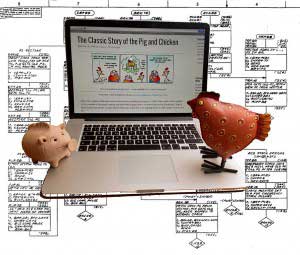
Licensed under the Creative Commons Attribution-Share Alike 3.0 Unported license.
A hen and a pig were sauntering down the main street of an Indiana town when they passed a restaurant that advertised “Delicious ham and eggs: 75¢.”
“Sounds like a bargain,” approved the hen. “That owner obviously knows how to run his business.”
“It’s all very well for you to be so pleased about the dish in question,” observed the pig with some resentment. “For you it is all in the day’s work. Let me point out, however, that on my part it represents a genuine sacrifice.”
Schwaber and Southerland¹ use a variation of this fable to illustrate two types of project members. Pigs are totally committed to the project and liable for its outcome. Chickens consult on the project and are informed of its progress. Chickens do not tell pigs what to do. By implication, a rooster is defined as a person who struts around offering uninformed and disobliging views. We all know a few roosters, don’t we?
¹Ken Schwaber and Jeff Southerland formerly presented Scrum as a software development approach at the International conference on Object-Oriented Programming, Systems, Languages and Applications 1995


Thanks for the information provided! we will use this information into our GPT/Chat-GPT dataset